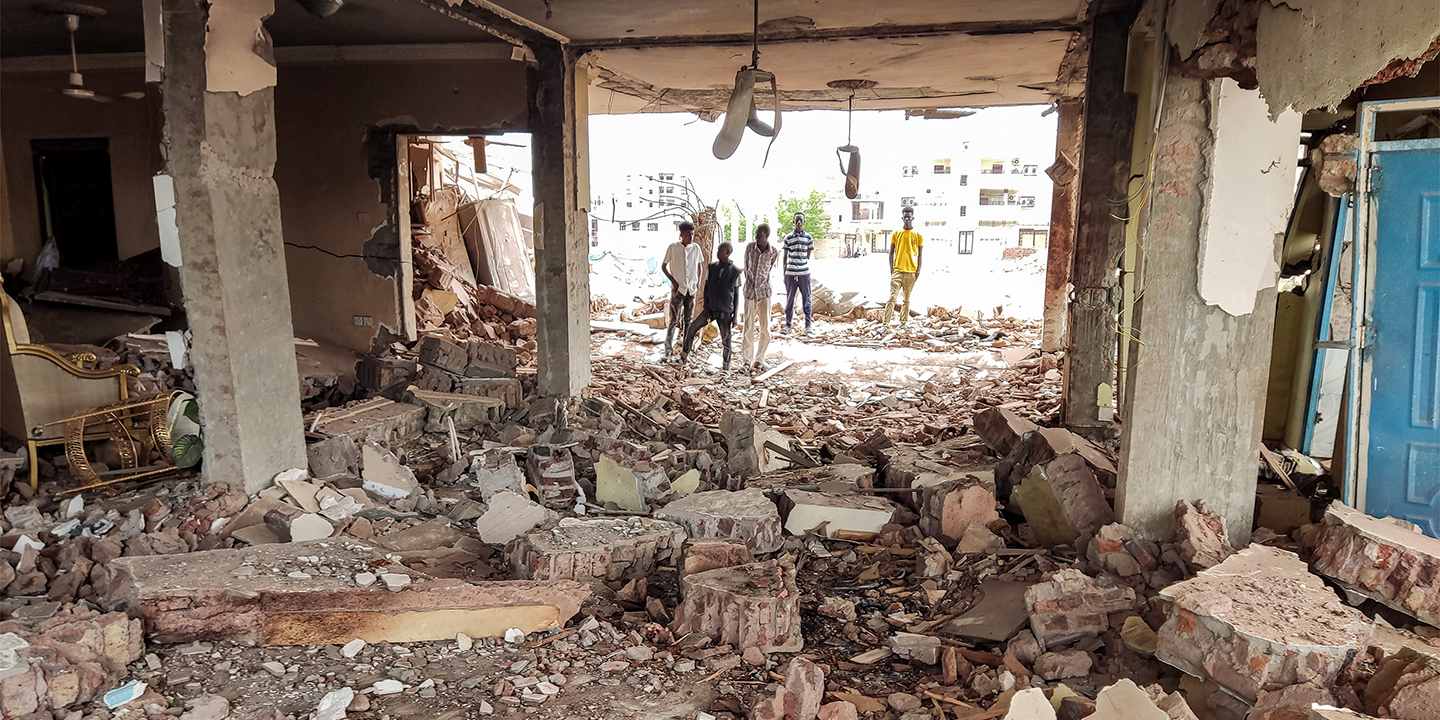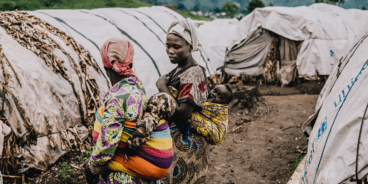

Survivors, Sudanese diaspora, atrocities prevention experts, and more issue warning of genocide in Darfur, Sudan.
We, the undersigned Darfuri survivors, members of the Sudanese diaspora, atrocities prevention experts, humanitarian aid professionals, academics, and advocates write this open letter as a warning and call to action. Twenty years ago, the world failed to prevent genocide in Darfur and has failed to hold perpetrators accountable for the last two decades. Action is needed now to avert further mass atrocities.
Years from now we do not want to hear that there was no warning. Let this serve as a clear warning, non-Arab populations in Darfur, especially members of the Masalit ethnic group, are at risk of genocide.
The armed conflict between the Sudan Armed Forces (SAF) and Rapid Support Forces (RSF), which began in April 2023, risks descending into a protracted conflict. Since the start of the conflict, over 3,000 people have been killed and nearly three million people have been displaced. While civilians across the country are at risk due to this ongoing war, the history of genocide coupled with recent reports of ethnically-targeted violence against civilians in Darfur means there is a higher risk of mass atrocities being committed against non-Arab populations in Darfur.
With the RSF’s increased force strength, power, and influence the threat to civilians in Darfur has grown considerably. During the genocide that began in 2003, Janjaweed militias, with support from the Sudanese government, were responsible for some of the worst violence against civilians in Darfur. The Janjaweed evolved into the RSF in 2013. Janjaweed members and leaders, including Mohamed Hamdan Dagalo (aka “Hemedti”), the current leader of the RSF, have never been held accountable for the mass atrocities they’ve continued to commit since the early 2000s.
As Alice Wairimu Nderitu, United Nations Special Adviser on the Prevention of Genocide, stated, “When perpetrators of past atrocities are not held accountable for their action, we are doomed to see history repeat itself.” Unfortunately, we are seeing history repeat itself right now.
The current violence in Darfur echoes the past with several reports indicating non-Arab groups are specifically being targeted. Doctors serving with Médecins Sans Frontières have reportedly said that El Geneina, the capital of West Darfur, “has become one of the worst places on earth.” Credible reports and satellite imagery have shown “systematic arson attacks reportedly by the RSF.” Razing of villages was a tactic often employed throughout the Darfur genocide of the early 2000s.
There have also been targeted killings of high-profile individuals. On June 14th, the Governor of West Darfur, Khamis Abdallah Abbakar, was assassinated. His death came just hours after he criticized the RSF for committing genocide. The United Nations Integrated Transition Assistance Mission in Sudan (UNITAMS) stated that, “Compelling eyewitness accounts attribute this act to Arab militias and the Rapid Support Forces (RSF).” Additionally, several members of the Masalit Sultan Saad Bahreldin’s family have been targeted and killed, including his brother.
The situation is dire. On June 15th, United Nations Under-Secretary-General for Humanitarian Affairs and Emergency Relief Coordinator Martin Griffiths wrote on Twitter, “Darfur is spiraling into a humanitarian calamity. People are trapped in a living nightmare…The world cannot allow this to happen. Not again.”
The failures of the international community to protect the people of Darfur cannot continue. It is not too late to take decisive action, live up to the Responsibility to Protect, and prevent further loss of life.
We urge:
-
-
- The RSF, allied militias, and the SAF — respect international human rights and humanitarian law, refrain from targeting civilians, allow safe passage of civilians, and support unrestricted access of humanitarian aid and assistance. The RSF and allied militias must cease targeted attacks against non-Arab civilians.
- Saudi Arabia and the United Arab Emirates — pressure the conflicting parties to respect international humanitarian and human rights law. Unless there are repercussions for their actions, nothing will change. The governments of Saudi Arabia and the UAE should issue sanctions, asset freezes, and cut off any support for parties that violate international law.
- The United Nations — deploy a UN or hybrid civilian protection force in Darfur and Khartoum with a strong protection of civilians mandate, to establish safe zones and humanitarian corridors, and to assist with the work of the UN Integrated Transition Assistance Mission in Sudan (UNITAMS). Since the United Nations — African Union Hybrid Operation in Darfur (UNAMID) ended its mission in 2020, violence against civilians in Darfur has been on the rise.
- establish an independent monitoring mechanism similar to the mechanisms established to investigate crimes in Myanmar and Syria. Perpetrators must be held accountable for mass atrocity crimes committed in Darfur, and elsewhere in Sudan. We cannot wait until this war is over to first begin collecting evidence. Accountability is imperative to achieve durable peace in Sudan.
- The United States — appoint a Presidential Envoy who will lead U.S. diplomatic efforts with Sudanese civil society and regional partners to develop a strategy centered on protecting civilians and bringing an end to the conflict.
- engage in strong diplomatic efforts with the EU, UK, Saudi Arabia, and the UAE to secure multilateral sanctions. While U.S. targeted sanctions are a useful tool, alone they are unlikely to have a significant impact. Multilateral targeted sanctions would cut off the financial flows that are funding the arms and fueling the conflict. Specifically, efforts must be made to block Russia’s Wagner Group from extracting conflict gold from Darfur in partnership with the RSF in exchange for arms.
-
Signed,
- Samah Salman, President, US-Educated Sudanese Association (USESA)
- Lauren Fortgang, Director, Never Again Coalition
- Niemat Ahmadi Founder and President, Darfur Women Action Group
- Hagir Elsheikh, TSI & SHRN
- Adlan Abdelaziz, Commissioner, Sudan Human Rights Network
- Aymen Tabir, Torture Abolition and Survivors Support Coalition TASSC ED
- Mutasim Ali, Member of Diaspora (specialized in human rights and anti-corruption sanctions)
- Safiya Abbadi, Canadian-Sudanese community member + advocate
- Ismail Adam, Darfur Association of Canada
- Mahjob Abdalla, Darfur Diaspora Association — Canada
- Hiba Sharief, President, Ensaniya Inc.
- Siddiq Khamis, Member of Diaspora
- Mohamed Ibrahim, Adjunct Professor
- Maha Tambal, Program Manager -Sudan
- Eric Reeves, Trustee, Darfur Bar Association
- John Prendergast, Co-Founder, The Sentry
- Mike Brand, Adjunct Professor of Genocide Studies and Atrocities Prevention Advocate
- Eileen Weiss Co-Founder, NY Coalition for Sudan
- Matthew Kohn, Independent Documentary Filmmaker in the two Sudans
- Martha Boshnick, Activist
- Caroline Gullick, Humanitarian Aid Professional
- Cory Williams, Co-Founder Darfur and Beyond
- Beth McDaniel, Genocide Prevention Activist
- Ned Laskowski, former Save Darfur Washington State
- Marty Fromer, Area Coordinator, Amnesty International USA
- Ernesto Verdeja, Associate Professor of Peace Studies and Global Politics, University of Notre Dame
- Elizabeth Phillippo, Retired from NSCC
- Einas Khairy, Human Rights Activist
- Mohamed Khalil, Professor
- Eiman Elwidaa, Freedom and Justice Activist
- M Tomsons, Never Again International — Canada
- Aaza Hassan, Advocate
- Emily Sample, Executive Board, International Association of Genocide Scholars
- Daniel Rothbart, Professor of Conflict Analysis and Resolution at George Mason University
- Paul Fagan, Director, Democracy Program, McCain Institute
- Faith Model, Worked for Customary Land Tenure Project and Lulu Works
- Christine Savino, University of Oxford, Oxford Faculty of Law — International Human Rights Law Student
- Celestin Musekura, Human Rights and Genocide Prevention Specialist
- Dorette Smit, Humanitarian Aid Professional
- Haram Elsheikh
- David Rosenberg, Coordinator, Pittsburgh Darfur Emergency Coalition
- Nadir Satti, IT Consultant
- Kelley Szany, Co-Chair, Illinois Holocaust and Genocide Commission
- Terry Nickelson, Humanitarian Entrepreneur
- Kyle Matthews, Executive Director, Montreal Institute for Genocide and Human Rights Studies
- Rana Abdelghaffar, Abdelraheem Human Rights Lawyer
- Stacey Schamber, International Civil Society Action Network (ICAN)
- Jacob Phillips, J.D. Georgetown University Law Center
- Jenna Walmer, PhD Student
- Dr. Darren O’Brien Chair, Australian Institute for Holocaust and Genocide Studies, Honorary Senior Research Fellow, School of Historical and Philosophical Inquiry, University of Queensland, Australia
- Stevan Bozanich, Visiting Assistant Professor, Whitman College
- Mehnaz Afridi, Professor of Religious Studies
- Deborah Mayersen Senior Lecturer, University of New South Wales Canberra at the Australian Defence Force Academy
- Victor Bivell, Publisher, Pollitecon Publications
- Yael Siman, Professor of Genocide Studies
- John Dunn, Visiting Assistant Professor of Human Rights and Education, University of Connecticut
- Olakunle Folami, Associate Professor Olakunle Folami, Adekunle Ajasin University, Nigeria
- Alan Whitehorn, Professor Emeritus, Political Science
- Ali al Bayati, Former Member of Iraqi High Commission for Human Rights, founder of Turkmen Rescue Foundation, Founder of Defenders for Human Rights
- Eve Zucker, Adjunct Associate Research Scholar, Columbia University
- Simarjit Kaur, Associate TARAN Widow Survivors Punjab
- Melanie O’Brien, Associate Professor of International Law, University of Western Australia
- Ibrahim S. Malazada, Fellow of Norbert Elias Foundation, Member of IAGS, Specialized in Kurdish genocide studies
- Joachim Savelsberg, Professor of Sociology and, by courtesy, Law; Arsham and Charlotte Ohanessian Chair, University of Minnesota
- George Foden, Humanitarian Researcher
- Vicky Kapogianni, Lecturer in Public International Law at University of Reading, UK
- Joe Delap, Professor of History, Athens State University
- Robert Jackson, Author/publisher of historical novels dealing with war & atrocities; Independent historian
- Rubina Peroomian, Ph.d. Genocide Scholar
- Julie Hurst-Whitehouse, Humanitarian aid professional and PhD Researcher
- Gregory H Stanton, President, Genocide Watch
- Tali Nates, Director, Johannesburg Holocaust & Genocide Centre
- Marie Lamensch, Program and outreach coordinator, Montreal Institute for Genocide and Human Rights Studies
- Caitlyn OFlaherty, Advocate and former humanitarian aid professional
- Jasmine Ramsey, Beyond Conflict Program Director on Preventing, Addressing, and Healing from Violent Conflict
- Elisa von Joeden-Forgey, Endowed Chair, Department of Holocaust and Genocide Studies, Keene State College (NH, USA); Executive Director, Lemkin Institute for Genocide Prevention
- Alexis A. Poston, Lemkin Institute for Genocide Prevention
- Andrea Dillingham, Humanitarian Aid Professional
- Léa Périllat, Program Manager — Lemkin Institute for Genocide Prevention
- Paul Turner, President and Executive Director, Fund for Peace
- Jonathan Leader Maynard, Lecturer in International Politics, King’s College London
- Samantha Lakin, Lecturer in Conflict Resolution, University of Massachusetts Boston
- Esther Sprague, Founder and Director, Sudan Unlimited
- Phil Orchard, Associate Professor of International Relations, University of Wollongong
- Abdelaziz Yakub, Editor-in-Chief Alhamish Voice
- Savita Pawnday, Executive Director, Global Centre for the Responsibility to Protect
- The Common Good Foundation, Inc. Non-profit USA
- Atrocities Watch Africa
- Pan African Lawyers Union
- International Refugee Rights Initiative
- Dr. Hilly Moodrick-Even Khen, Professor of Genocide Studies
- Hana Bashir, Diaspora
- Mohammadain Ishag, Human Rights Activist and Journalist
- Nada Fadul, President, SuDRO
Related Content


